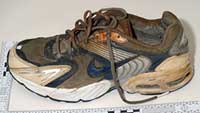
Running shoe that contained a mystery foot
A human foot wearing a running shoe washed ashore in British Columbia recently. It is the eleventh foot to have washed up on the coast of the Salish Sea, the coastal waterways surrounding southern Vancouver Island and Puget Sound, since 2007. Eight feet have washed up around Vancouver and three feet have come ashore in Washington state.
Foot Washes Ashore in Canada, the 11th Since 2007
Stephen Fonseca [of the British Columbia Coroners Service] said that human remains can come apart naturally in a water environment, and with the high amount of marine activity, beaches, and people involved in accidents in the water, it’s likely that these are all unrelated cases. He also noted that there are many bridges over waterways in the area, and distraught people who may have jumped could also be a cause for the body parts washing up on shore.
“Running shoes of today are more buoyant,” he said, “and it’s a very rational explanation that when the feet do disarticulate, through marine scavenging and decomposition, the shoe will bring the foot back up to the surface and it will float there until it reaches shoreline.”
The Coroners Service will try and build a profile of the person to whom the foot belonged through DNA testing as well as spatial and temporal profiles based on where and when the shoe arrived, how old the foot is, and when the running shoe was made, he said.
“When dealing with feet, we don’t have the luxury of building up a very comprehensive profile, with blue eyes and blond hair. A 16-year-old could have the same size shoe as a 65 year old,” he said.
Fonseca and other coroners would be going over the foot today to ensure that it was a human remain, and then would begin compiling information on what they called its “donor.” The process could take weeks or months, at which time the data would be compared to missing persons lists, he said.
This foot was found in an inlet near False Creek, a protected body of water, he said, while other feet were found on beaches and nearby islands. He hoped the location of this foot would be helpful to determining its origin.
